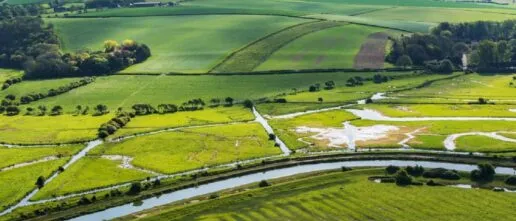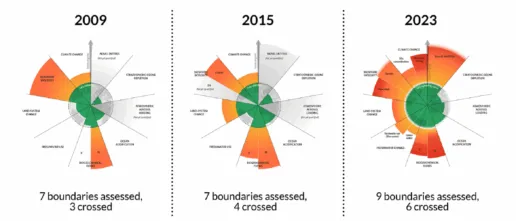Erle Ellis is Professor of Geography and Environmental Systems at the University of Maryland, Baltimore County (UMBC) where he directs the Anthroecology Laboratory.
His research investigates the ecology of human landscapes at local to global scales to inform sustainable stewardship of the biosphere in the Anthropocene. His recent work examines long-term changes in Earth’s ecology produced by human societies through the concept of anthropogenic biomes, or anthromes, a term he introduced in 2008.
He has developed online tools for global synthesis of local knowledge (GLOBE) and inexpensive tools for mapping landscapes in 3D (Ecosynth). He is a Global Highly Cited Researcher, a UMBC Presidential Research Professor, a lead author on the IPBES Transformative Change Assessment, a Fellow of the Global Land Programme, a Senior Fellow of the Breakthrough Institute and a former member of the Anthropocene Working Group of the International Commission on Stratigraphy. He teaches environmental science and landscape ecology at UMBC and has taught ecology at Harvard’s Graduate School of Design. His first book, Anthropocene: A Very Short Introduction was published by Oxford University Press in 2018.
Related News Articles

New Global Index Aims to Help People and Nature Thrive Together
Researchers at Oxford University join the United Nations Development Programme to propose an optimistic, practical approach to inspire stronger action on nature.

Anthromes with Erle Ellis
Human societies and their use of land have transformed ecology across this planet for thousands of years. As a result, the global patterns of life on Earth, the biomes, can no longer be understood without considering how humans have altered them. Anthromes, or anthropogenic biomes, characterise the globally significant ecological patterns created by sustained direct […]
Related Events

Nature is Culture: The Deep Global History and Transformative Future of Nature-Sustaining Landscapes
Global historical reconstructions of human transformation and use of landscapes confirms that most of terrestrial nature as we know it, including Earth’s most biodiverse landscapes, are cultural legacies of centuries to millennia of sustained human use. Efforts to build a better future for people and the nature begin by recognizing that cultural natures, including those […]

The planetary boundaries framework: helpful for shaping human futures?
The framework of planetary boundaries is widely applied to encapsulate the idea that human transformation of the planet is in danger of breaching multiple thresholds in planetary function, leading to dangerous consequences for human futures and for wider life on Earth.
Related Outputs
An aspirational approach to planetary futures
A new paper in Nature Prevailing frameworks to address planetary environmental challenges tend to focus on setting goals, targets, or boundaries to limit human harm to ecosystems or species. Here we propose an aspirational approach aimed at empowering people to shape a better future for all of life on Earth.
Anthromes with Erle Ellis
In this podcast we discuss the relationship of humans and nature with Professor Erle Ellis. We look at how since the dawn of humanity we’ve been impacting the land. Now as these impacts gather pace and lead to undesirable outcomes we discuss how we can reframe the role of the human species as being an […]
Nature Seminar Series. Nature is Culture: The Deep Global History and Transformative Future of Nature-Sustaining Landscapes. Erle Ellis
Global historical reconstructions of human transformation and use of landscapes confirms that most of terrestrial nature as we know it, including Earth’s most biodiverse landscapes, are cultural legacies of centuries to millennia of sustained human use. Efforts to build a better future for people and the nature begin by recognizing that cultural natures, including those […]

